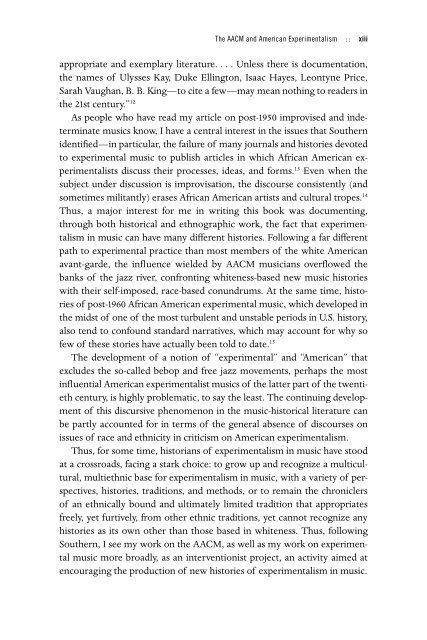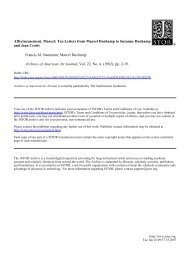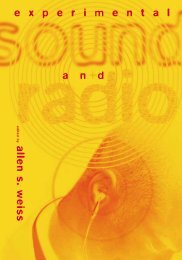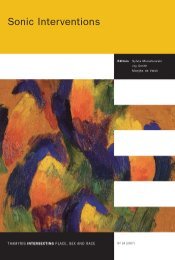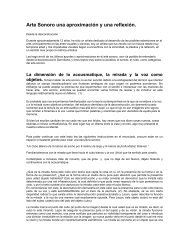- Page 2: A POWER STRONGER THAN ITSELF
- Page 5 and 6: GEORGE E. LEWIS is the Edwin H. Cas
- Page 7 and 8: vi : : Contents 4 FOUNDING THE COLL
- Page 10 and 11: THE AACM AND AMERICAN EXPERIMENTALI
- Page 12 and 13: The AACM and American Experimentali
- Page 16 and 17: acknowledgments This book presents
- Page 18 and 19: Acknowledgments : : xvii arrival, e
- Page 20 and 21: Acknowledgments : : xix expanded ve
- Page 22: Acknowledgments : : xxi Where some
- Page 25 and 26: xxiv : : Introduction had invited m
- Page 27 and 28: xxvi : : Introduction fact, I was n
- Page 29 and 30: xxviii : : Introduction that the pr
- Page 31 and 32: xxx : : Introduction tend to be cri
- Page 33 and 34: xxxii : : Introduction for its cohe
- Page 35 and 36: xxxiv : : Introduction work of toda
- Page 37 and 38: xxxvi : : Chapter Summaries from th
- Page 39 and 40: xxxviii : : Chapter Summaries vatio
- Page 41 and 42: xl : : Chapter Summaries participan
- Page 43 and 44: xlii : : Chapter Summaries ative pe
- Page 45 and 46: xliv : : Chapter Summaries this sit
- Page 47 and 48: xlvi : : Chapter Summaries mobility
- Page 49 and 50: xlviii : : Chapter Summaries of sup
- Page 51 and 52: 2 : : Chapter One family, whose his
- Page 53 and 54: 4 : : Chapter One resemblance to th
- Page 55 and 56: 6 : : Chapter One pest infestations
- Page 57 and 58: 8 : : Chapter One whose business wa
- Page 59 and 60: 10 : : Chapter One something of a
- Page 61 and 62: 12 : : Chapter One eighteenth- cent
- Page 63 and 64: 14 : : Chapter One this was “one
- Page 65 and 66:
16 : : Chapter One day and Lester Y
- Page 67 and 68:
18 : : Chapter One For young black
- Page 69 and 70:
20 : : Chapter One ideas and techni
- Page 71 and 72:
22 : : Chapter One around and I was
- Page 73 and 74:
24 : : Chapter One humorous remembr
- Page 75 and 76:
26 : : Chapter One radio and the ju
- Page 77 and 78:
28 : : Chapter One Economic forces
- Page 79 and 80:
30 : : Chapter Two and night, day a
- Page 81 and 82:
32 : : Chapter Two in a sea of whit
- Page 83 and 84:
34 : : Chapter Two ble source of th
- Page 85 and 86:
36 : : Chapter Two into theater, da
- Page 87 and 88:
38 : : Chapter Two of sound, compos
- Page 89 and 90:
40 : : Chapter Two reliance by youn
- Page 91 and 92:
42 : : Chapter Two composer alterna
- Page 93 and 94:
44 : : Chapter Two The criticism of
- Page 95 and 96:
46 : : Chapter Two Tests who dissen
- Page 97 and 98:
48 : : Chapter Two cism. Perhaps no
- Page 99 and 100:
50 : : Chapter Two Americans, but m
- Page 101 and 102:
52 : : Chapter Two were not welcome
- Page 103 and 104:
54 : : Chapter Two their time betwe
- Page 105 and 106:
56 : : Chapter Three My fi rst enco
- Page 107 and 108:
58 : : Chapter Three craft of arran
- Page 109 and 110:
60 : : Chapter Three tion between s
- Page 111 and 112:
62 : : Chapter Three into the Regal
- Page 113 and 114:
64 : : Chapter Three I would go the
- Page 115 and 116:
66 : : Chapter Three phonist Albert
- Page 117 and 118:
68 : : Chapter Three bassist] Leste
- Page 119 and 120:
70 : : Chapter Three to composition
- Page 121 and 122:
72 : : Chapter Three drove a Chicag
- Page 123 and 124:
74 : : Chapter Three turned out to
- Page 125 and 126:
76 : : Chapter Three There was much
- Page 127 and 128:
78 : : Chapter Three fellow soldier
- Page 129 and 130:
80 : : Chapter Three of migrants fr
- Page 131 and 132:
82 : : Chapter Three At Hirsch, Bar
- Page 134 and 135:
FOUNDING THE COLLECTIVE Urban Decli
- Page 136 and 137:
Founding the Collective : : 87 twen
- Page 138 and 139:
Founding the Collective : : 89 Amer
- Page 140 and 141:
Founding the Collective : : 91 cord
- Page 142 and 143:
Founding the Collective : : 93 Tayl
- Page 144 and 145:
Founding the Collective : : 95 have
- Page 146 and 147:
Founding the Collective : : 97 Jacq
- Page 148 and 149:
Founding the Collective : : 99 be s
- Page 150 and 151:
Founding the Collective : : 101 vin
- Page 152 and 153:
Founding the Collective : : 103 “
- Page 154 and 155:
Founding the Collective : : 105 her
- Page 156 and 157:
Founding the Collective : : 107 be
- Page 158 and 159:
Founding the Collective : : 109 Don
- Page 160 and 161:
Founding the Collective : : 111 by
- Page 162 and 163:
Founding the Collective : : 113 cie
- Page 164 and 165:
FIRST FRUITS The First Year: Concer
- Page 166 and 167:
First Fruits : : 117 New AACM membe
- Page 168 and 169:
First Fruits : : 119 They’d organ
- Page 170 and 171:
First Fruits : : 121 I thought it w
- Page 172 and 173:
First Fruits : : 123 est, and we sh
- Page 174 and 175:
First Fruits : : 125 guys that came
- Page 176 and 177:
First Fruits : : 127 ing group that
- Page 178 and 179:
First Fruits : : 129 rett. 28 By th
- Page 180 and 181:
First Fruits : : 131 At the time I
- Page 182 and 183:
First Fruits : : 133 organization w
- Page 184 and 185:
First Fruits : : 135 of chance occu
- Page 186 and 187:
First Fruits : : 137 bling concessi
- Page 188 and 189:
First Fruits : : 139 Park, in the s
- Page 190 and 191:
First Fruits : : 141 don’t you pl
- Page 192 and 193:
First Fruits : : 143 music’s abil
- Page 194 and 195:
First Fruits : : 145 about his rece
- Page 196 and 197:
First Fruits : : 147 ing in the Mel
- Page 198 and 199:
First Fruits : : 149 however—most
- Page 200 and 201:
First Fruits : : 151 lenge to New Y
- Page 202 and 203:
First Fruits : : 153 The Coda revie
- Page 204 and 205:
First Fruits : : 155 turing the ide
- Page 206 and 207:
First Fruits : : 157 played with th
- Page 208 and 209:
First Fruits : : 159 the planet Sat
- Page 210 and 211:
First Fruits : : 161 cordings Corbe
- Page 212 and 213:
THE AACM TAKES OFF The Black Arts M
- Page 214 and 215:
The AACM Takes Off : : 165 lashes,
- Page 216 and 217:
The AACM Takes Off : : 167 “to or
- Page 218 and 219:
The AACM Takes Off : : 169 on the A
- Page 220 and 221:
The AACM Takes Off : : 171 came up
- Page 222 and 223:
The AACM Takes Off : : 173 ries abo
- Page 224 and 225:
The AACM Takes Off : : 175 The AACM
- Page 226 and 227:
The AACM Takes Off : : 177 as it ca
- Page 228 and 229:
The AACM Takes Off : : 179 the Schi
- Page 230 and 231:
The AACM Takes Off : : 181 nouncing
- Page 232 and 233:
The AACM Takes Off : : 183 with Leo
- Page 234 and 235:
The AACM Takes Off : : 185 note: Ev
- Page 236 and 237:
The AACM Takes Off : : 187 ceived t
- Page 238 and 239:
The AACM Takes Off : : 189 ness.
- Page 240 and 241:
The AACM Takes Off : : 191 Bowie’
- Page 242 and 243:
The AACM Takes Off : : 193 zine’s
- Page 244 and 245:
The AACM Takes Off : : 195 what you
- Page 246 and 247:
The AACM Takes Off : : 197 just one
- Page 248 and 249:
The AACM Takes Off : : 199 Moreover
- Page 250 and 251:
The AACM Takes Off : : 201 the rece
- Page 252 and 253:
The AACM Takes Off : : 203 emy. If
- Page 254 and 255:
The AACM Takes Off : : 205 a cerebr
- Page 256 and 257:
The AACM Takes Off : : 207 by remin
- Page 258 and 259:
The AACM Takes Off : : 209 in the c
- Page 260 and 261:
The AACM Takes Off : : 211 consider
- Page 262 and 263:
The AACM Takes Off : : 213 still fu
- Page 264 and 265:
AMERICANS IN PARIS Conceiving the W
- Page 266 and 267:
Americans in Paris : : 217 As the y
- Page 268 and 269:
Americans in Paris : : 219 me into
- Page 270 and 271:
Americans in Paris : : 221 There wa
- Page 272 and 273:
Americans in Paris : : 223 trope th
- Page 274 and 275:
Americans in Paris : : 225 I said,
- Page 276 and 277:
Americans in Paris : : 227 tween Eu
- Page 278 and 279:
Americans in Paris : : 229 a Chicag
- Page 280 and 281:
Americans in Paris : : 231 we live,
- Page 282 and 283:
Americans in Paris : : 233 Parisian
- Page 284 and 285:
Americans in Paris : : 235 lington
- Page 286 and 287:
Americans in Paris : : 237 lution.
- Page 288 and 289:
Americans in Paris : : 239 which cl
- Page 290 and 291:
Americans in Paris : : 241 I’ll t
- Page 292 and 293:
Americans in Paris : : 243 converts
- Page 294 and 295:
Americans in Paris : : 245 The youn
- Page 296 and 297:
Americans in Paris : : 247 was a lo
- Page 298 and 299:
Americans in Paris : : 249 Stravins
- Page 300 and 301:
Americans in Paris : : 251 challeng
- Page 302 and 303:
Americans in Paris : : 253 who were
- Page 304 and 305:
Americans in Paris : : 255 similate
- Page 306:
Americans in Paris : : 257 at least
- Page 309 and 310:
260 : : Chapter Eight knew I wouldn
- Page 311 and 312:
262 : : Chapter Eight “St. Louis
- Page 313 and 314:
264 : : Chapter Eight to get a horn
- Page 315 and 316:
266 : : Chapter Eight Lake recalled
- Page 317 and 318:
268 : : Chapter Eight the army, I w
- Page 319 and 320:
270 : : Chapter Eight and ensembles
- Page 321 and 322:
272 : : Chapter Eight the foundatio
- Page 323 and 324:
274 : : Chapter Eight left the coll
- Page 325 and 326:
276 : : Chapter Eight the funding,
- Page 327 and 328:
278 : : Chapter Eight In Jamaica, h
- Page 329 and 330:
280 : : Chapter Eight there with th
- Page 331 and 332:
282 : : Chapter Eight school orches
- Page 333 and 334:
284 : : Chapter Eight Room was a ta
- Page 335 and 336:
286 : : Chapter Eight and Down Beat
- Page 337 and 338:
288 : : Chapter Eight cian and goin
- Page 339 and 340:
290 : : Chapter Eight at one of the
- Page 341 and 342:
292 : : Chapter Eight as Iqua Colso
- Page 343 and 344:
294 : : Chapter Eight not your high
- Page 345 and 346:
296 : : Chapter Eight might interfe
- Page 347 and 348:
298 : : Chapter Eight tion at North
- Page 349 and 350:
300 : : Chapter Eight Jazz Showcase
- Page 351 and 352:
302 : : Chapter Eight becoming a mo
- Page 353 and 354:
304 : : Chapter Eight I was standin
- Page 355 and 356:
306 : : Chapter Eight lot of it was
- Page 357 and 358:
308 : : Chapter Eight nightlife sce
- Page 359 and 360:
310 : : Chapter Eight with Richard
- Page 361 and 362:
312 : : Chapter Eight began to noti
- Page 363 and 364:
314 : : Chapter Eight ond album as
- Page 365 and 366:
316 : : Chapter Eight a number of o
- Page 367 and 368:
318 : : Chapter Eight was my percus
- Page 369 and 370:
320 : : Chapter Eight In hindsight,
- Page 371 and 372:
322 : : Chapter Eight cry from ‘o
- Page 373 and 374:
324 : : Chapter Eight make me think
- Page 375 and 376:
326 : : Chapter Nine ion Brown, Rah
- Page 377 and 378:
328 : : Chapter Nine ing in a water
- Page 379 and 380:
330 : : Chapter Nine “most New Yo
- Page 381 and 382:
332 : : Chapter Nine had staged a
- Page 383 and 384:
334 : : Chapter Nine area during th
- Page 385 and 386:
336 : : Chapter Nine All the [Midwe
- Page 387 and 388:
338 : : Chapter Nine Europe and the
- Page 389 and 390:
340 : : Chapter Nine I stayed at Ri
- Page 391 and 392:
342 : : Chapter Nine not be able to
- Page 393 and 394:
344 : : Chapter Nine array of infra
- Page 395 and 396:
346 : : Chapter Nine in bringing AA
- Page 397 and 398:
348 : : Chapter Nine The most advan
- Page 399 and 400:
350 : : Chapter Nine of clubs conti
- Page 401 and 402:
352 : : Chapter Nine movement.” 9
- Page 403 and 404:
354 : : Chapter Nine At fi rst, the
- Page 405 and 406:
356 : : Chapter Nine music previous
- Page 407 and 408:
358 : : Chapter Nine those people.
- Page 409 and 410:
360 : : Chapter Nine In retrospect,
- Page 411 and 412:
362 : : Chapter Nine conventionally
- Page 413 and 414:
364 : : Chapter Nine In contrast, A
- Page 415 and 416:
366 : : Chapter Nine expression of
- Page 417 and 418:
368 : : Chapter Nine part, black cl
- Page 419 and 420:
370 : : Chapter Nine of the race of
- Page 421 and 422:
372 : : Chapter Nine more challengi
- Page 423 and 424:
374 : : Chapter Nine posed the ques
- Page 425 and 426:
376 : : Chapter Nine phonograph com
- Page 427 and 428:
378 : : Chapter Nine products of th
- Page 429 and 430:
380 : : Chapter Nine Nonetheless, b
- Page 431 and 432:
382 : : Chapter Nine These cavils n
- Page 433 and 434:
384 : : Chapter Nine notable of all
- Page 435 and 436:
386 : : Chapter Nine professional w
- Page 437 and 438:
388 : : Chapter Nine African Americ
- Page 439 and 440:
390 : : Chapter Ten program, where
- Page 441 and 442:
392 : : Chapter Ten Edward Wilkerso
- Page 443 and 444:
394 : : Chapter Ten We were saying
- Page 445 and 446:
396 : : Chapter Ten panels. For exa
- Page 447 and 448:
398 : : Chapter Ten ward Wilkerson,
- Page 449 and 450:
400 : : Chapter Ten that we had a g
- Page 451 and 452:
402 : : Chapter Ten they fostered t
- Page 453 and 454:
404 : : Chapter Ten the emergence o
- Page 455 and 456:
406 : : Chapter Ten family lived a
- Page 457 and 458:
408 : : Chapter Ten somewhat, and f
- Page 459 and 460:
410 : : Chapter Ten “The next day
- Page 461 and 462:
412 : : Chapter Ten Rita Warford; a
- Page 463 and 464:
414 : : Chapter Ten me to ask him q
- Page 465 and 466:
416 : : Chapter Ten ing,” said Ew
- Page 467 and 468:
418 : : Chapter Ten 1980, when NEA
- Page 469 and 470:
420 : : Chapter Ten the organizatio
- Page 471 and 472:
422 : : Chapter Ten There was some
- Page 473 and 474:
424 : : Chapter Ten were living in
- Page 475 and 476:
426 : : Chapter Ten for a hour stra
- Page 477 and 478:
428 : : Chapter Ten on a national l
- Page 479 and 480:
430 : : Chapter Ten There used to b
- Page 481 and 482:
432 : : Chapter Ten Hopkins, Steve
- Page 483 and 484:
434 : : Chapter Ten and I knew how
- Page 485 and 486:
436 : : Chapter Ten from the busine
- Page 488 and 489:
INTO THE THIRD DECADE The 1980s: Ca
- Page 490 and 491:
Into the Third Decade : : 441 kins,
- Page 492 and 493:
Into the Third Decade : : 443 not j
- Page 494 and 495:
Into the Third Decade : : 445 black
- Page 496 and 497:
Into the Third Decade : : 447 which
- Page 498 and 499:
Into the Third Decade : : 449 conti
- Page 500 and 501:
Into the Third Decade : : 451 Here,
- Page 502 and 503:
Into the Third Decade : : 453 ing f
- Page 504 and 505:
Into the Third Decade : : 455 In ou
- Page 506 and 507:
Into the Third Decade : : 457 thusi
- Page 508 and 509:
Into the Third Decade : : 459 Hirsc
- Page 510 and 511:
Into the Third Decade : : 461 been
- Page 512 and 513:
Into the Third Decade : : 463 pus.
- Page 514 and 515:
Into the Third Decade : : 465 dent
- Page 516 and 517:
Into the Third Decade : : 467 beaut
- Page 518 and 519:
Into the Third Decade : : 469 the A
- Page 520 and 521:
Into the Third Decade : : 471 That
- Page 522 and 523:
Into the Third Decade : : 473 of Tu
- Page 524 and 525:
Into the Third Decade : : 475 Emoti
- Page 526 and 527:
Into the Third Decade : : 477 enoug
- Page 528 and 529:
Into the Third Decade : : 479 the o
- Page 530 and 531:
TRANSITION AND REFLECTIONS 12 New Y
- Page 532 and 533:
Transition and Reflections : : 483
- Page 534 and 535:
Transition and Reflections : : 485
- Page 536 and 537:
Transition and Reflections : : 487
- Page 538 and 539:
Transition and Reflections : : 489
- Page 540 and 541:
Transition and Reflections : : 491
- Page 542 and 543:
Transition and Reflections : : 493
- Page 544:
Transition and Reflections : : 495
- Page 547 and 548:
498 : : Afterword beyond quotation,
- Page 549 and 550:
500 : : Afterword institutions to a
- Page 551 and 552:
502 : : Afterword “But it didn’
- Page 553 and 554:
504 : : Afterword that are necessar
- Page 555 and 556:
506 : : Afterword been operating as
- Page 557 and 558:
508 : : Afterword ments of Downtown
- Page 559 and 560:
510 : : Afterword faceted time in w
- Page 561 and 562:
512 : : Afterword played more of a
- Page 563 and 564:
514 : : Afterword those individuals
- Page 565 and 566:
516 : : Appendix A Difda, Kalaparus
- Page 568 and 569:
SELECTED AACM RECORDINGS appendix b
- Page 570 and 571:
Selected AACM Recordings : : 521 Br
- Page 572:
Selected AACM Recordings : : 523 Mi
- Page 575 and 576:
526 : : Notes to Preface 7. Lincoln
- Page 577 and 578:
528 : : Notes to Chapter Summaries
- Page 579 and 580:
530 : : Notes to Chapter One 17. Fa
- Page 581 and 582:
532 : : Notes to Chapter One 51. De
- Page 583 and 584:
534 : : Notes to Chapter Two genera
- Page 585 and 586:
536 : : Notes to Chapter Two lor, C
- Page 587 and 588:
538 : : Notes to Chapter Two 117. I
- Page 589 and 590:
540 : : Notes to Chapter Three 21.
- Page 591 and 592:
542 : : Notes to Chapter Four CHAPT
- Page 593 and 594:
544 : : Notes to Chapter Four 44. M
- Page 595 and 596:
546 : : Notes to Chapter Four 82. S
- Page 597 and 598:
548 : : Notes to Chapter Five herea
- Page 599 and 600:
550 : : Notes to Chapter Five 68. B
- Page 601 and 602:
552 : : Notes to Chapter Five liter
- Page 603 and 604:
554 : : Notes to Chapter Five 156.
- Page 605 and 606:
556 : : Notes to Chapter Six 47. Do
- Page 607 and 608:
558 : : Notes to Chapter Six 104. R
- Page 609 and 610:
560 : : Notes to Chapter Six dancer
- Page 611 and 612:
562 : : Notes to Chapter Seven 39.
- Page 613 and 614:
564 : : Notes to Chapter Seven 74.
- Page 615 and 616:
566 : : Notes to Chapter Seven that
- Page 617 and 618:
568 : : Notes to Chapter Seven inte
- Page 619 and 620:
570 : : Notes to Chapter Eight in D
- Page 621 and 622:
572 : : Notes to Chapter Eight 49.
- Page 623 and 624:
574 : : Notes to Chapter Eight impo
- Page 625 and 626:
576 : : Notes to Chapter Eight 113.
- Page 627 and 628:
578 : : Notes to Chapter Nine 27.
- Page 629 and 630:
580 : : Notes to Chapter Nine 60. F
- Page 631 and 632:
582 : : Notes to Chapter Nine 81. S
- Page 633 and 634:
584 : : Notes to Chapter Nine See M
- Page 635 and 636:
586 : : Notes to Chapter Nine 168.
- Page 637 and 638:
588 : : Notes to Chapter Nine 205.
- Page 639 and 640:
590 : : Notes to Chapter Ten 22. Se
- Page 641 and 642:
592 : : Notes to Chapter Ten 54.
- Page 643 and 644:
594 : : Notes to Chapter Eleven 16.
- Page 645 and 646:
596 : : Notes to Chapter Eleven 55.
- Page 647 and 648:
598 : : Notes to Chapter Twelve 6.
- Page 650 and 651:
ibliography 8 Bold Souls. 8 Bold So
- Page 652 and 653:
Bibliography : : 603 “Ad Lib: Chi
- Page 654 and 655:
Bibliography : : 605 Barg, Lisa.
- Page 656 and 657:
Bibliography : : 607 “Biography o
- Page 658 and 659:
Bibliography : : 609 Cohen, Noal, a
- Page 660 and 661:
Bibliography : : 611 Delcloo, Claud
- Page 662 and 663:
Bibliography : : 613 Feldman, Morto
- Page 664 and 665:
Bibliography : : 615 Gray, Herman S
- Page 666 and 667:
Bibliography : : 617 Ives, Charles.
- Page 668 and 669:
Bibliography : : 619 King, Martin L
- Page 670 and 671:
Bibliography : : 621 Lipsitz, Georg
- Page 672 and 673:
Bibliography : : 623 ———. Mor
- Page 674 and 675:
Bibliography : : 625 “Negroes Pro
- Page 676 and 677:
Bibliography : : 627 Pareles, Jon.
- Page 678 and 679:
Bibliography : : 629 Samana. Samana
- Page 680 and 681:
Bibliography : : 631 “Strictly Ad
- Page 682 and 683:
Bibliography : : 633 Vincent, Ted.
- Page 684:
Bibliography : : 635 Yogananda, Par
- Page 687 and 688:
638 : : Index Abrams, Muhal Richard
- Page 689 and 690:
640 : : Index Association for the A
- Page 691 and 692:
642 : : Index Bethe, David, 176 Bha
- Page 693 and 694:
644 : : Index Brimfi eld, Bill, 410
- Page 695 and 696:
646 : : Index Christian, Jodie (con
- Page 697 and 698:
648 : : Index Coursil, Jacques, 229
- Page 699 and 700:
650 : : Index Dream, The (AACM inte
- Page 701 and 702:
652 : : Index Favors, Malachi (cont
- Page 703 and 704:
654 : : Index Gillespie, Dizzy (con
- Page 705 and 706:
656 : : Index Hinton, Milt, 12 hipp
- Page 707 and 708:
658 : : Index Jarman, Joseph (conti
- Page 709 and 710:
660 : : Index Kalaparush (continued
- Page 711 and 712:
662 : : Index Madhubuti, Haki (Don
- Page 713 and 714:
664 : : Index Model Cities, 261, 26
- Page 715 and 716:
666 : : Index New York, 1950-60 (co
- Page 717 and 718:
668 : : Index race (continued) 369;
- Page 719 and 720:
670 : : Index Shepp, Archie (contin
- Page 721 and 722:
672 : : Index Stubblefi eld, John (
- Page 723 and 724:
674 : : Index Vinson, Eddie “Clea
- Page 725:
676 : : Index Yippies, the (Youth I


